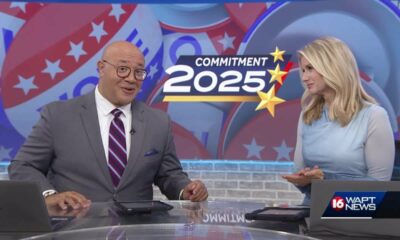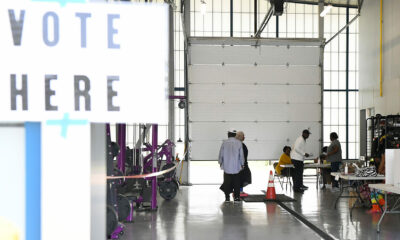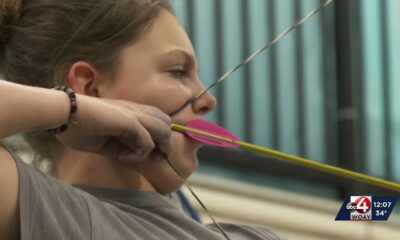Mississippi Today
Golf is an international affair in the Sun Belt and in NCAA Division I
Golf is an international affair in the Sun Belt and in NCAA Division I

MADISON — So there was Thongpipat Rattanayan – not so easy for me to type – on the par-4 third hole at Jack Nicklaus-designed Annandale Golf Club Tuesday morning. He was exactly 82 yards from the hole and approximately 10,000 miles from his home in Bangkok, Thailand.
Rattanayan, who thankfully goes by Pat, took out his trusty lob wedge, took dead aim and took an easy, compact swing.
“I knew it was close,” he would say in perfectly good English about three and a half hours later. “I didn’t know how close because that big bunker in front of the green was blocking my view.”

Somebody behind the green hollered, “It went in the hole!”
Said Rattanayan, “I said to myself, ‘What? It went in! Really?’”
Really. The resulting eagle deuce was easily the highlight of his day as Rattanayan, a senior at Southern Miss, shot a one-over-par 73 in the second round of the Sun Belt Conference Golf Championship.
And there was Robbie Latter, on the par-5 18th at Annandale nearly 200 yards from the hole and about 1,200 miles from his Canadian home in Missauga, Ontario, after his booming 345-yard drive. Latter, another 22-year-old USM senior, laced a 6-iron second shot that never left the pin. The ball bounced once, missed by perhaps three inches, and then trickled about 10 feet past the hole. Latter sank the eagle putt to finish a round of even-par 72.
Latter, even par after 36 holes, is tied for sixth place (of 70 golfers) individually going into Wednesday’s third and final stroke play round of the Sun Belt event. Southern Miss, the tournament host, is tied for fourth in the 14-team tournament. After Wednesday’s third round, the top four teams will enter match play to determine the conference champion on Thursday.
Southern Miss needs a strong finish in the conference championship to advance to the 64-team NCAA Tournament for the first time in school history.
Said Golden Eagle coach Eddie Brescher, “We’re on the bubble now, but if we have a good showing tomorrow, I believe we’ll be in.”
Ole Miss and Mississippi State are both nationally ranked and already have punched their tickets into the NCAA Tournament. State’s roster includes players from Portugal, Switzerland, England, Poland and South Africa. Two Swedes and another player from Thailand play for Rebels. College golf in Mississippi, as well most everywhere else, is an international affair.
“My guess is that if you take the entirety of Division I golf, probably 50% of the players are foreign players,” Brescher said. “In the Sun Belt, I’m not sure it’s not more like two-thirds are imports.”
On the Sun Belt leaderboard, the top 10 and ties include two Swedes and also golfers from England, Canada, South Africa and Slovenia.
“If you’re going to be competitive, you gotta get the best players you can get wherever you can get them,” Brescher said. “Three of our five players here are international. Four of the eight on our roster are international, and I can promise you we have more on the way.”
So, you might ask, how does a player named Thongpipat Rattanyan from Bangkok find his way to Hattiesburg, Mississippi?
“In Thailand, there is no college golf,” Rattanyan said. “You either turn pro after high school or you come to the U.S. to play college golf.”
When Rattanyan was 16, he decided he wanted to come to the U.S. He flew to San Diego to play in a big international junior tournament, which Brescher attended. Said Rattanyan, “I played terrible in that tournament, but I did talk to Coach Brescher.”

Brescher liked what he heard from Rattanyan and did his homework to learn that the Bangkok teen was capable of playing much better golf than he had in San Diego. And “Pat” surely has. For four years, he has been one of USM’s steadiest players and also best students. He will graduate next month with a degree in marketing. His parents will attend his graduation, visiting Hattiesburg for the first time. Because of COVID, “Pat” has another year of eligibility, which he intends to use, and start work toward earning an MBA.
“Let me tell you something about Pat,” Brescher said. “He’s as good as gold. If you have a daughter, I promise you, you would be really happy if she were to marry Pat. He’s as solid as they come.”
Latter, one of the longest hitters in college golf, plans to play a fifth season at USM as well. “I love Hattiesburg, love everything about it,” Latter said.
He loves it so much, he enticed his younger, 6-foot-7-inch brother, Tommy Latter, a freshman, to follow him to Southern Miss. “Tommy hits is farther than I do,” he said.
And that’s not all. The Latters’ parents, Rob and Ann Latter, plan to retire to Hattiesburg in the near future. Said Robbie Latter, “My parents had always planned to retire to Florida, but that’s changed after they have been to Hattiesburg. They love the place.”
Meanwhile, Robbie Latter may well have a future in golf beyond college. Again, he hits it a mile. He finished runner-up last summer in the Canadian Amateur championship. If he can fine-tune his iron game and his putting – to go with his monster drives – he could make a living in golf.
That’s to be determined. A nice first step toward all that could come Wednesday, and perhaps Thursday, at Annandale, where golfers from all over the globe are making their mark.
This article first appeared on Mississippi Today and is republished here under a Creative Commons license.
Mississippi Today
Pharmacy benefit manager reform likely dead
Hotly contested legislation that aimed to increase the transparency and regulation of pharmacy benefit managers appeared dead in the water Tuesday after a lawmaker challenged the bill for a rule violation.
The bill was sent back to conference after Rep. John Hines, D-Greenville, raised a point of order challenging the addition of code sections to the bill, which will likely kill it.
House members in the past have chosen to turn a blind eye to the rule, which would require the added code sections to be removed when the bill is returned to conference. This fatal flaw will make it difficult to revive the legislation.
“It will almost certainly die,” said House Speaker Jason White, who authored the legislation. “And you can celebrate that with your pharmacist when you see them.”
“…This wasn’t ‘gotcha.’ Everybody in this chamber knew that code sections were added, because the attempt was to make 1123 more suitable to all the parties.”
The bill sought to protect patients and independent pharmacists, who have warned that if legislators do not pass a law this year to regulate pharmacy benefit managers, which serve as middlemen in the pharmaceutical industry, some pharmacies may be forced to close. They say that the companies’ low payments and unfair business practices have left them struggling to break even.
The bill underwent several revisions in the House and Senate before reaching its most recent form, which independent pharmacists say has watered the bill down and will not offer them adequate protection.
House Bill 1123, authored by White, originally focused on the transparency of pharmacy benefit managers. The Senate then beefed up the bill by adding provisions barring the companies from steering patients to affiliate pharmacies and prohibiting spread pricing – the practice of paying insurers more for drugs than pharmacists in order to inflate pharmacy benefit managers’ profits.
Independent pharmacists, who have flocked to the Capitol to advocate for reform this session, widely supported the Senate’s version of the bill.
The Senate incorporated several recommendations from the House into its bill, saying that they believed that the legislation would have the House’s support.
Instead, the House sent the bill to conference and requested additional changes, including new language that would eliminate self-funded insurance plans, or health plans in which employers assume the financial risk of covering employees’ health care costs themselves, from a section of the bill that prohibits pharmacy benefit managers from steering patients to specific pharmacies.
This language seeks to satisfy employers, who argue that regulating pharmacy benefit managers’ business practices will lead to higher health insurance costs.
Sen. Rita Parks, R-Corinth, who has spearheaded pharmacy benefit manager reform efforts in the Senate, previously said that adding the language to the bill would “remove any protection out of the law.” But she signed the conference report that included the language Monday after a heated conference meeting between lawmakers.
Rep. Hank Zuber, R-Ocean Springs and co-author of the bill, said the bill has something for everybody, gesturing to its concessions for employers and independent pharmacists. He said the bill gives independent pharmacists 85% of what they wanted.
Mississippi Independent Pharmacies Association director Robert Dozier was not available for comment by the time the story published.
Zuber told House members Tuesday to “blame the Senate” for the slow progress of pharmacy benefit manager reform in Mississippi, citing the body’s failure to take up a drug pricing transparency bill half a decade ago, for three years in a row.
“If the Senate had followed the leadership and the legislation that we drafted those many years ago, we would not be here,” Zuber said. “We would have the information on drug pricing, we would have the information and transparency on (pharmacy benefit managers) and we would have the ultimate reason as to why drug costs continue to rise.”
Members of the House expressed dissatisfaction with the legislation Tuesday, arguing it did not do enough to ensure lower prescription drug costs for consumers.
“I’m going to try to do something next year that goes even further,” Zuber responded.
For the past several years, lawmakers have proposed bills to regulate pharmacy benefit managers, but none have made it as far as this session.
“We’ll go another year,” said White.
This article first appeared on Mississippi Today and is republished here under a Creative Commons license.![]()
Mississippi Today
Feuding GOP lawmakers prepare to leave Jackson without a budget, let governor force them back
After months of bitter Republican political infighting, the Legislature appears likely to end its session Wednesday without passing a $7 billion budget to fund state agencies, potentially threatening a government shutdown if they don’t come back and adopt one by June 30.
After the House adjourned Tuesday night, Speaker Jason White said he had presented the Senate with a final offer to extend the session, which would give the two chambers more time to negotiate a budget. As for now, the 100 or so bills that make up the state budget are dead.
The Senate leadership was expected to meet and consider the offer Tuesday evening, White said. But numerous senators both Republican and Democrat said they would oppose such a parliamentary resolution, and Lt. Gov. Delbert Hosemann has also said it’s unlikely and that the governor will have to force lawmakers back into special session.
White said he believes, if the Senate would agree to extend the session and restart negotiations, lawmakers could pass a budget and end the 2025 session by Sunday, only a few days later than planned.
But if the Senate chooses not to pass a resolution extending the session, White said the House would end the session on Wednesday.
It would take a two-thirds vote of support in both chambers to suspend the rules and extend the session. The Senate opposition appears to be enough to prevent that.
Still, the speaker said he believes Lt. Gov. Delbert Hosemann and Senate leaders are considering the proposal. But he said if he doesn’t hear a positive response by Wednesday, the House will adjourn and wait for Gov. Tate Reeves to call a special session at a later date.
“We are open to (extending the session), but we will not stay here until Sunday waiting around to see if they might do it,” White said.
White said leaving the Capitol without a budget and punting the issue to a special session might not cool tensions between the chambers, as some lawmakers hope.
“I think when you leave here and you end up in a special session, some folks say, ‘Well everybody that’s upset will cool down by then.’ They may, or it may get worse. It may shine a different and specific light on some of the things in this budget and the differences in the House and Senate,” White said. “Whereas, I think everybody now is in the legislative mode, and we might get there.”
The Mississippi Constitution does not grant the governor much power, but if Gov. Tate Reeves calls lawmakers into a special session, he gets to set the specific legislative agenda — not lawmakers.
White said the governor could potentially use his executive authority to direct lawmakers to take up other bills, such as those related to education, before getting to the budget.
“When we leave here without a budget, it is entirely the governor’s prerogative to when he (sets a special session) and how he does that.”
While the future of the state’s budget hangs in the balance, lawmakers have spent the remaining days of their regular session trying to pass the few remaining bills that remained alive on their calendars.
House approves DEI ban, Senate could follow suit on Wednesday
The House on Tuesday passed a proposal to ban diversity, equity and inclusion programs from public schools, and both chambers approved a measure to establish a form of early voting.
The House approved a conference report compromise to ban DEI programs and a list of “divisive concepts” from K-12 schools, community colleges and universities. If the Senate follows suit, Mississippi would join a number of other Republican-controlled states and President Donald Trump, who has made rooting DEI out of the federal government one of his top priorities.
The agreement between the Republican-dominated chambers follows hours of heated debate in which Democrats, all almost of whom are Black, excoriated the legislation as a setback in the long struggle to make Mississippi a fairer place for minorities. Legislative Republicans argued the legislation will elevate merit in education and remove from school settings “divisive concepts” that exacerbate divisions among different identity groups.
The concepts that will be rooted out from curricula include the idea that gender identity can be a “subjective sense of self, disconnected from biological reality.” The move reflects another effort to align with the Trump administration, which has declared via executive order that there are only two sexes.
The House and Senate disagreed on how to enforce the act, but ultimately settled on an agreement that would empower students, faculty members and contractors to sue schools for violating the law, but only after they go through an internal campus review process that would give schools time to make changes. The legislation could also withhold state funds from schools that don’t comply.
Legislature sends ‘early voting lite’ bill to governor
The Legislature also overwhelmingly passed a proposal to establish a watered down version of early voting, though the legislation is titled “in-person excused voting,” and not early voting.
The proposal establishes 22 days of in-person voting before Election Day that requires voters to go to the circuit clerk’s office or another location county officials have designated as a secure early voting facility, such as a courtroom or a board of supervisors meeting room.
To cast an early vote, someone must present a valid form of photo ID and list one of about 15 legal excuses to vote before Election Day. The excuses, however, are broad and would, in theory, allow many people to cast early ballots.
Examples of valid excuses are voters expecting to work on Election Day, being at least 65 years old, being currently enrolled in college or potentially travelling outside of their county on Election Day.
Since most eligible voters either work, go to college or are older than 65 years of age, these excuses would apply to almost everyone.
“Even though this isn’t early voting as we saw originally, it makes this more convenient for hard working Mississippians to go by their clerks’ office and vote in person after showing an ID 22 days prior to an election,” Senate Elections Chairman Jeremy England said.
Republican Gov. Tate Reeves opposes early voting, so it’s unclear if he would sign the measure into law or veto it.
Both chambers are expected to gavel at 10 a.m. on Wednesday to debate the final items on their agenda.
This article first appeared on Mississippi Today and is republished here under a Creative Commons license.
Mississippi Today
‘A lot of us are confused’: Lacking info, some Jacksonians go to wrong polling place
Johnny Byrd knew that when his south Jackson neighborhood Carriage Hills changed wards during redistricting last year, his neighbors would have trouble finding their correct polling place on Election Day.
So he bought a poster board and inscribed it with their new voting location – Christ Tabernacle Church.
“I made a sign and placed it in front of the entrance to our neighborhood that told them exactly where to go so there would be no confusion,” said Byrd, vice president of the Association of South Jackson Neighborhoods.
Still, on April 1, a car full of voters from a senior living facility who should have gone to Christ Tabernacle were driven to their old polling place.
“I thought it was unfortunate they had to get there and find out rather than knowing in advance that their polling location was different,” said Sen. Sollie Norwood, a Democrat from Jackson who was on the ground Tuesday helping constituents with voting.
One of those elderly women became frustrated and said she no longer wanted to vote, Norwood said, though her companions tried to convince her otherwise. By midday Tuesday, 300 people had voted at Christ Tabernacle, one of the city’s largest precincts currently in terms of registered voters, but among the lowest in turnout historically.
Voting rights advocates and candidates vying for municipal office in Jackson are keeping an eye on issues facing voters at the polls, though without official results, it remains to be seen if that will dampen turnout this election with the hotly contested Democratic primary.
“I still believed it was gonna be low,” Monica McInnis, a program manager for the nonprofit OneVoice, said of turnout. “I was expecting it would be a little higher because of what is on the ballot and how many people are running in all of the wards as well as the mayor’s race.”
The situation is evolving as the day goes on, but the main issues are twofold. One, thousands of Jackson voters have new precinct locations after redistricting last year put them into a new city council ward.
Two, some voters didn’t realize their polling place for the municipal elections may differ from where they voted in last year’s national elections, which are run by the counties.
In Mississippi, voters are assigned two precincts that are often but not always the same: A municipal location for city elections and a county location for senate, gubernatorial and presidential elections
“People in Mississippi, we go to the same polling location for three years, and that fourth year, it changes,” said Jada Barnes, an organizer with the Jackson-based nonprofit MS Votes. “A lot of us are confused. When people are going to the polling place today, they’re seeing it is closed, so they’re just going back home which is making turnout go even lower.”
Barnes said she’s hearing this primarily from a few Jackson voters who called a hotline that MS Votes is manning. Lack of awareness around polling locations is a big deterrent, she said, because most people are trying to squeeze their vote in between work, school or family responsibilities.
“Maybe you’re on your lunch break, you only got 30 minutes to go vote, you learn that your polling location has changed and now you have to go back to work,” she said.
Norwood said he heard from a group of students assigned to vote at Christ Tabernacle who had attempted to vote at the wrong precinct and were told their names weren’t on the rolls. They didn’t know they had been moved from Ward 4 to Ward 6, Norwood said, meaning they expected to vote in a different council race until reaching the polls Tuesday.
Though voters have a duty to be informed of their polling location, Barnes said city and circuit clerks and local election commissioners are ultimately responsible for making sure voters know where to go on Election Day.
Angela Harris, the Jackson municipal clerk, said her office worked to inform voters by mailing out thousands of letters to Jacksonians whose precincts changed, including the roughly 6,000 whose wards changed during the 2024 redistricting.
“I am over-swamped,” she said yesterday.
Despite her efforts, at least one voter said he never got a letter. Stephen Brown learned through Facebook, not an official notice, that he was moved from Ward 1 to Ward 2.

A resident of the Briarwood Heights neighborhood in northeast Jackson, Brown’s efforts to vote Tuesday have been complicated by mixed messages and a lack of communication. He has yet to vote, even though he showed up at the polls at 7:10 this morning.
His odyssey took him to two wrong locations, where the poll managers instructed Brown to call his ward’s election commissioner, who did not answer multiple calls, Brown said. Brown finally learned through a Facebook comment that he could look up his new precinct on the Mississippi Secretary of State’s website — if he scrolled down the page past his county precinct information.
This afternoon, Brown has a series of meetings planned, so now he’s hoping for a 30-minute window to try voting one more time, even though he’s skeptical it will make a difference.
“I’m a very disenchanted voter, because I’ve been let down so much,” he said. “I vote because it’s the thing that I’m supposed to do and because of the sacrifices of my ancestors, but not because I truly believe in it, you know?”
Brown’s not alone in facing turbulence. Back at Christ Tabernacle, one Jackson voter, who declined to give her name, said she’s frustrated from having to drive to three polling locations in one day.
“I’m dissatisfied with the fact that I had to drive from one end of this street and all of the back to come over here when I usually vote over here on Highway 18,” she said. “This was a great inconvenience, gas wise and time wise.”
The same thing happened to Rodney Miller. He called the confusion some voters are facing in this election “unnecessary.”
“That ain’t the way we should be handling business,” he said. “We should be looking out for one another better than that, you know? It’s already enough getting people out to vote, and when you confuse them when they try? Come on now. That’s discouraging.”
Christ Tabernacle is the second largest precinct in the city in terms of registered voters, with 3,330 assigned to vote there as of 2024, according to documents retrieved from the municipal election committee. But it had one of the lowest voter turnout rates – 10% in the 2021 primary election before redistricting and before it became so large.
Byrd mentioned the much higher turnout in places like Ward 1 in northeast Jackson, compared to where he lives in south Jackson. Why does Byrd think this is?
“Civics,” Byrd said. “They took civics out of school. If you ask the average person what is the role and responsibility of any elected official, they can’t tell you.”
This article first appeared on Mississippi Today and is republished here under a Creative Commons license.![]()
-

 News from the South - Florida News Feed6 days ago
News from the South - Florida News Feed6 days agoFamily mourns death of 10-year-old Xavier Williams
-

 News from the South - Alabama News Feed5 days ago
News from the South - Alabama News Feed5 days agoSevere storms will impact Alabama this weekend. Damaging winds, hail, and a tornado threat are al…
-

 News from the South - Alabama News Feed4 days ago
News from the South - Alabama News Feed4 days agoUniversity of Alabama student detained by ICE moved to Louisiana
-

 News from the South - Louisiana News Feed6 days ago
News from the South - Louisiana News Feed6 days agoSeafood testers find Shreveport restaurants deceiving customers with foreign shrimp
-

 News from the South - Oklahoma News Feed7 days ago
News from the South - Oklahoma News Feed7 days agoWhy are Oklahomans smelling smoke Wednesday morning?
-

 News from the South - Oklahoma News Feed3 days ago
News from the South - Oklahoma News Feed3 days agoTornado watch, severe thunderstorm warnings issued for Oklahoma
-

 News from the South - West Virginia News Feed6 days ago
News from the South - West Virginia News Feed6 days agoRoane County Schools installing security film on windows to protect students
-

 News from the South - West Virginia News Feed7 days ago
News from the South - West Virginia News Feed7 days agoStudents in Monroe County Schools are ready to shoot their way to the WV State Archery Championships












































